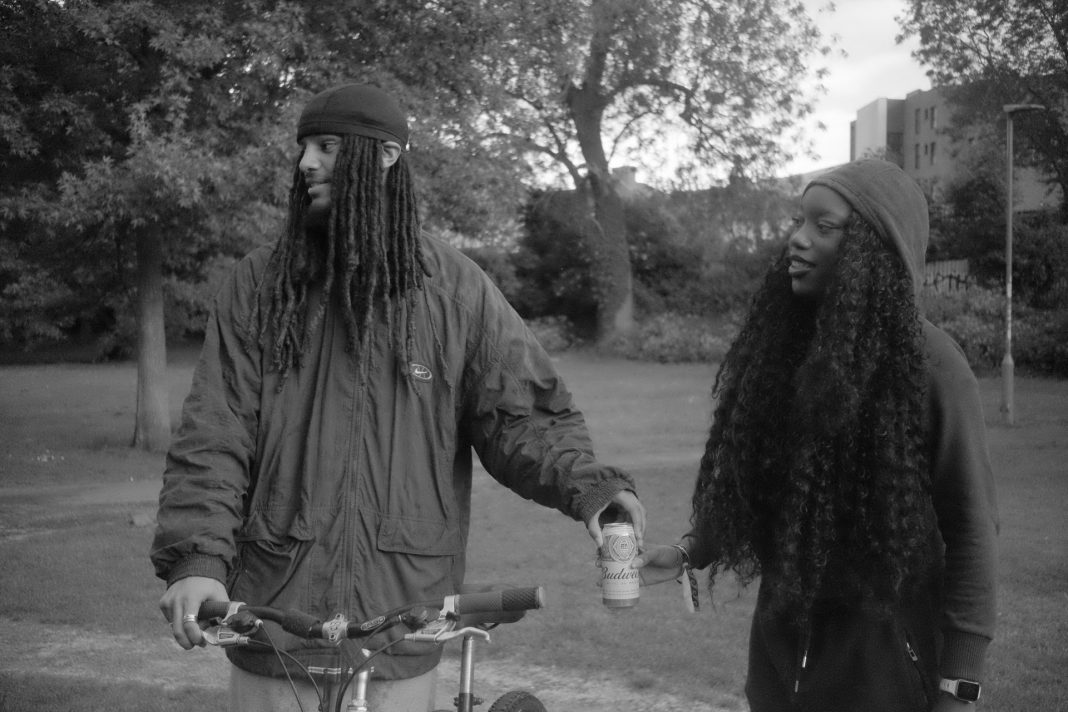Student theatre has always thrived on experimentation, collaboration, and the courage to speak up. So Far, So Good, a new piece of original writing by Melissa Chetata-Brooks, undoubtedly embraces all three. From its very first moment, a stark countdown projected onto a television screen, the play situates itself as a work with something urgent to say.
Drawing inspiration from the cult French film La Haine, it promises an unflinching look at grief, community, and the cycles of violence, with a particular focus on the impact of knife crime in the UK. The production’s heart is also in the right place, raising awareness for the Ben Kinsella Trust, a charity that works against violent crimes through education, and showcasing a richly diverse cast and creative team.
What makes So Far, So Good compelling in concept is its desire to break traditional boundaries, not just thematically, but in its form. The play integrates music, photography, and video into the storytelling. A raised bedroom set cleverly evokes adolescence, while the live DJ, who scores scene transitions, provides moments of atmospheric immersion that sometimes outshine the dramatic action itself. At times, the soundtrack is so arresting that it momentarily pulls the audience out of the plot, leaving one almost tempted to ask for the DJ’s playlist rather than follow the next twist of the story.
The performances are spirited, and several cast members bring a striking presence to the stage. Alexa (Damola Arin) is especially strong as the voice of reason among a group of teenagers caught in cycles of violence and mistrust. Arin delivers her lines with a grounded conviction that offers the audience an anchor in a narrative full of instability. Her moments of lightness are just as impactful as her serious ones, as when she deadpans “This isn’t the 1950s” during a conversation about leaving an abusive partner, eliciting a much-needed burst of laughter from the audience amidst the play’s heavier moments.
Other standout scenes include a heart-wrenching exchange between Josh (Kwame Appafram) and the mother of Isaiah, who was killed before the beginning of the play, and Sheila (Arya Coban), which offers a rare pause for grief to be processed rather than performed. Joseph Beckett as Cain brings an unsettling authenticity to the role of Kia’s (Carla Mukasa) abusive boyfriend. So much so that when he calmly microwaved a lasagna mid-argument, I was gripped by an overwhelming urge to leap onstage and fling it straight into his smug face, ideally while it was still scalding-hot from the microwave.
But So Far, So Good also grapples with a recurring issue in student-written theatre: how to match strong themes with a coherent script. There are frequent moments of poetic ambition – Kayla’s monologue near the end is delivered with emotional force by Nyla Thomas – but the writing at times feels rushed or under-explored. Motives shift quickly, and characters occasionally serve the demands of the plot over psychological depth. For example, Kayla’s sister, Kia’s, relationship with Cain is clearly central to the story, yet the nature of her dependence on him remains vague. Given that she seems to live with her siblings and has other forms of support, her continued attachment to him is underwritten, making her eventual tragic fate feel more like a narrative necessity than a character-driven outcome.
The play’s most symbolic device – a gun that passes from hand to hand, eventually resulting in Kia’s accidental death – raises further questions. While a direct nod to La Haine’s motif of circular violence, its presence in this setting strains plausibility. The characters are teenagers in Oxfordshire, involved in low-level drug activity at most. The ease with which a gun is obtained and how casually it is passed between characters feels more like a borrowed cinematic trope than an organically integrated plot point. It gestures toward the gravity of systemic violence but lacks the infrastructural context that would make it believable.
Some narrative choices are similarly discordant. At one point, Alexa offers Kia £20 to leave town and pursue her dreams of becoming an actress. The gesture is sweet, but also jarringly unrealistic, especially in an economic climate where £20 barely covers a train ticket, let alone a new life. Other lines, like Kayla’s sudden insistence that she’s the one holding everything together and taking care of everyone, are delivered with power but lack sufficient buildup provided that no indication of this had been given before, creating emotional beats that don’t always feel entirely earned.
That said, the production’s sincerity and ambition are undeniable. The use of multimedia, the focus on inclusivity, and the determination to tell stories about marginalised experiences are all crucial contributions to Oxford’s theatrical landscape. Chetata-Brooks speaks with great clarity in her interview about the need for student theatre to evolve into a space where multiple art forms intersect and where new voices are embraced on their own terms, without being reduced to labels like “diverse” or treated as a “niche” interest. Her work is a direct manifestation of that vision.
So Far, So Good may not be polished, and some moments feel less fully realised, but it’s a production that deserves attention and respect for what it sets out to do. It asks its audience to engage with uncomfortable truths, and even when its storytelling falters, its underlying message comes through: these characters, these stories, and these conversations matter. For a debut play, it shows remarkable promise, and more importantly, it opens the door for others to step forward and try, fail, or succeed on their own terms. In student theatre, that is something to be encouraged, and should never be critiqued out of existence.


